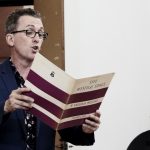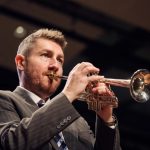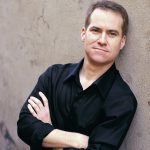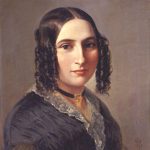Tell us a little about your early life – what made you realise you wanted your future to be in music?
Music emerged in me as a spontaneous phenomenon. In those days, children started musical education by the time they were seven years old, but I started quite a bit later. A little toy electronic keyboard at a friend’s place got me interested in “searching for” assorted sounds. I would listen to radio and television commercials and I would try to sing the songs I would hear. You could say I was self-taught to start. My parents brought me a bigger keyboard and I started playing it. They noticed something interesting could develop and signed me up at the conservatorium. I was 14 and relatively older compared to my peers, but to catch up I took twice as many subjects year on year. My interest was with the piano, not with choral music. However, having to join the conservatorium’s choir allowed me to discover a wonderful world that I have not left ever since. I never thought I could develop a professional career in music, all I wanted was to enjoy music, but reality has shaped a wonderful path for which I’m truly grateful.
You’re from the Basque Country in Spain. What can you tell us about that region’s musical traditions?
The Basque Country is a part of Spain located in the north-east and bordering France. In addition to the Spanish language which we share with the rest of the country, we have our own language and our own identity. When thinking about Spain, one could think of a collective of folklore and traditions making us a collective of distinct peoples with our own ideologies and life manners. We are hardworking people, with important visionaries such as Saint Ignacio de Loiola or Juan Sebastian Elcano. Our folklore is rich in singing and dancing. In addition, in the early years of the 20th Century, we had the big fortune that several folklorists compiled songbooks with the traditional melodies before they would be lost. For the Basque composers, those books are chiefly important when it comes to writing and further developing our work.
You studied at the Conservatory of Pasaia and graduated as a singing and piano teacher. When did the inspiration come to begin composing your own music?
In reality, that was not something I was hoping for myself. I was the piano accompanist for our children’s choir, and the director asked me to compose some choral arrangements for the children. From then onwards, the opportunity emerged to write more and more music. Javier Busto, who is like a musical father to me, once saw one of my compositions and encouraged me to continue composing. I won several composition contests, and my music started being performed more often. In the beginning, it was primarily for children, but later music for mixed voices arrived and the universe of sounds was multiplied. At a specific point in time, in 2010, many people encouraged me to start www.elberdin.com, my website, so that the music I wrote could reach more people. I used to publish some work at a local publisher, until the arrival of Walton, followed by other publishers and my music became more famous. In addition, the Certamen de Coros de Tolosa (a very important event worldwide which takes place 30 km from home), has always boosted our music, exporting our culture and songs to the world. Thanks to the Certamen, many important choruses from around the world started performing my compositions, and from there other commissions emerged.
Could you describe for us the process of writing a new work? What inspires you to create?
Over the last few years, I have not had a chance to write music out of my own desire. Almost 100% of my writings are commissions, so that it is music specifically for someone. Usually, I’m very interested in the characteristics of the choir for which I’m writing music, such as their strengths and weaknesses, how many voices are available, and what type of piece they want or need. With all that information, the first requirement to start writing is to have a good text. Without text I don’t like to compose choral music, because the most important thing is to be able to “tell” something through melody and harmony. Once I have the text, I look through it a few times and try to improvise on the piano, and from there it goes directly to the music score. I attempt for what I write to transmit the feelings that the text suggests to me, and let the music be as descriptive as possible. In addition, often I try for the different voices to have melodic lines as interesting as possible, to allow for the music to be more singable by all the parts of the choir. I believe the secret in writing good choral music lies in attempting a three-fold view of the score: one view as a singer, noting what can be sung better technically and what is harder; one view as a director, allowing you to perceive in what places is the choir likely to encounter issues to learn and tune, or in what places you need to treat the choir in a precise manner; and finally the view of the composer, where you try to translate the ideas in your head in a piece of paper, so that later, thanks to the choir, they can reach the audience in a concert hall. If you have a global vision, you will have more information to hit the target with an optimal result.
Brisbane Chorale will be performing your work ‘Make A Joyful Noise’ in our upcoming concert on 14 November 2021. Tell us about how you came to write this beautiful piece.
It is an honour for me to learn that the Brisbane Chorale is going to sing my work. I’m so grateful. This piece was the result of a commission by my dear friend Brady Allred, director of the Salt Lake Choral Artists (Utah). I have had the privilege to write for Brady and his choir on several occasions, and it’s always exciting. We met in 2010 in Tolosa during the contest and a few months later he asked me to write ‘Cantate Domino’ that so many people have sung for years. A distinct feature of this piece is that it mixes Euskera (the Basque language), English and Latin. A few years ago, Brady came back to Tolosa for the 50th anniversary of the contest. He was invited with his choir and commissioned me to compose ‘Make a Joyful Noise’. We repeated the formula of writing in the three languages, with a piece that was meant to be rhythmic and thrilling, with a large technical complexity, so that it can be used in a competition. It was exciting to feel the energy of the piece at the Contest, and it had a big reception from the audience and the jury. The result is what you will be able to experience from the Brisbane Chorale in a few weeks. I’m convinced it will be vibrant and wonderful!
Which composer/s are your heroes and why?
I have many hero composers. The fact that they are interested in our musical space and instrument is very important. There are many music schools in which the choral component is not important. To them, only the symphonic one is of relevance. However, historically the big composers knew how to take advantage of an instrument like the choir. Nowadays, there are big composers of current and local music, and thanks to the new technologies we are more connected than ever before and can enjoy the success and the work of many of them. I could not compile a list because it would be too long, but they are my heroes because they know about music and how to take it from the head to the heart and to the senses. I only hope that the current and emerging composers will be able to perpetuate that same path.
Besides music, do you have any other special talents or skills you’d like to share with us?
Music governs and gives order to my life, although I always say it is not my principal objective, but the way to reach what matters to me the most: to achieve a better and more humane society. In addition to music, I studied Social Education because I believe we can aspire to become better people, and music can assist greatly to that end. My “hobby” would be based in trying to achieve a better world, not because it would harbour musicians with better technique, but because they would have their minds and hearts more open to reality. Besides that, I enjoy photography very much. It allows looking at life in a different manner. A good photo is like a big song – it can express many things with few elements.






